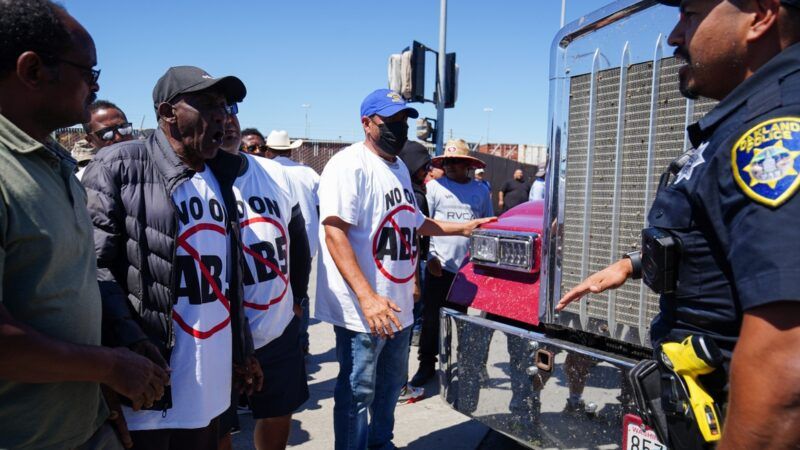Truckers Shut Down California Port Fighting for the Right To Be Their Own Bosses
The terrible consequences of A.B. 5 keep coming.

Independent truckers Wednesday shut down the terminals at the Port of Oakland in California to protest the impacts of a terrible labor law that may require them to become employees of trucking companies—regardless of whether they want these jobs.
An estimated 70,000 people who own and drive their own trucks in California may soon feel the effects of A.B. 5, a law passed in 2019 that controls and severely restricts who can work as independent contractors within the state. The initial bill came as a response to a 2018 California Supreme Court decision about truck drivers that established a strict test to determine whether a worker should be treated as a company employee or an independent contractor.
Though supporters of A.B. 5 insisted the bill would protect workers from predatory companies and ensure that they receive appropriate benefits and overtime pay, it was a massive disaster for people who genuinely wanted to work as private contractors and be their own bosses. It restricted the ability of freelancers so severely that a subsequent bill needed to be passed so that writers, artists, translators, real estate agents, and folks in many other lines of work could keep their independent gigs. Then, the primary targets of A.B. 5, ride-share and home delivery services like Uber, got relief from California voters through Proposition 22, which passed in November 2020.
Truckers, who launched this whole battle against the law, ended up being exempted from the effects of A.B. 5 for a time because of a lawsuit by the California Trucking Association arguing that federal law superseded A.B. 5 for their industry. Courts initially agreed, but then the federal 9th Circuit Court of appeals reversed the ruling in 2021. The plaintiffs appealed to the Supreme Court, but at the end of June, the Court declined to hear the case.
Truckers now find themselves in the same position they did in 2019, except now the country is also facing supply chain issues, labor shortages, inflation, and a jump in self-employment. Truckers who want to be their own bosses have been protesting at California ports this week to register their discontent.
Wednesday's protests managed to shut down terminals at Oakland International Container Terminal, where 2,100 trucks pass through to collect and deliver goods each day. It's the eighth-largest port in the U.S. Trucks blocked the gates, and according to CNBC, labor rules allow dockworkers to leave if they fear for their safety, so they did.
The truckers say Gov. Gavin Newsom has not been responding to their concerns that won't be able to continue driving independently. Via CNBC:
One of those protesting is Bill Aboudi, owner of AB Trucking. "So far there has been no contact with the governor's office. It seems the governor is not concerned about taking American workers' rights away," Aboudi said. "These are independent, small businesses that choose to operate their own trucks, and now that right is taken away from them. They do pay taxes, they do have insurance. It's their choice to do that."
CNBC reached out to Governor Gavin Newsom's office asking when the enforcement of the law would begin, as well as if truckers have a way within the law to remain independent. In an email to CNBC, the Governor's Office of Business and Economic Development (GO-Biz) Director Dee Dee Myers stated that with the federal courts rejecting the trucking industry's appeals, "it's time to move forward, comply with the law and work together to create a fairer and more sustainable industry for all."
One would think, if one were to actually take workers' rights seriously, that independent truckers should be able to decide for themselves whether their own work environment is "fair." That the state is insistent on pushing the law onto resisting laborers is at this point a very clear indicator that A.B. 5 was never about protecting workers from employers. It was always about protecting workers in heavily unionized industries from their competition. And now, it's yet another factor that will drive up inflation and the costs of the goods we purchase.



Show Comments (50)